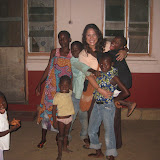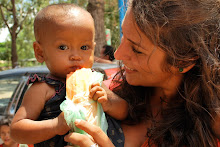So a couple of weeks ago I went to observe an HIV support group in Nkunya, one of the most underdeveloped villages in Kpando district. The prevalence of HIV/AIDS is very high in this area because two of the tribes were at war for so long and that war had a negative effect on education and development in the area. Most of the children who are at the orphanage are from Nkunya; it is about a 10 minute taxi ride from the center of Kpando.
I didn’t know what to expect at the support group because, as I have mentioned in previous blog posts, the stigma for HIV is so big. I wasn’t sure if there would be people throwing eggs at us or if we would be shoved in a secret room with 20 locks of protection. Upon hearing of the support group, I had mixed feelings about it. I thought it to be an amazing resource to have for those who are HIV positive, a safe place where they can disclose their status, express their problems and seek information and medical help without being ashamed. But on the other hand it also seems a bit dangerous because if you make one person in the support group angry for whatever reason, they can disclose your status to whomever they wish and there goes the rest of your livelihood.
Stigma, why is there a massive stigma that goes along with HIV/AIDS in Africa? Well from what I have concluded, it’s because previous to the Anti-retro viral treatment (medicine), if you were found to be HIV positive it was basically a death sentence, because AIDS was inevitable, it would come and take your life. Therefore, if you were positive you were good as dead, and in most cases, your family would stop taking care of you because in their eyes, they would be dumping resources into a black hole. Ju Ju, a form of black magic and/or sorcery was the traditional religion in Ghana before colonization brought Christianity, so there are still traces of this belief throughout the culture. AIDS and Ju Ju also go hand in hand. In some cases, if you are HIV positive, you are thought to be cursed and dangerous.
Nkunkya sits at the bottom of a huge, lush, green mountain. The scenery is absolutely beautiful, thinly paved roads winding around the lush countryside. The taxi Anthony and I took pulls over on the side of the road, about 4 km outside of the Nkunya center. A beautiful woman in a yellow t-shirt greets us at the roadside, takes the huge suitcase of donations we brought and heaves it atop her head then starts to lead us through the bush. We walk for about 5 minutes until we come upon a partially finished building of mud bricks and wooden beams filled with about 25 to 30 people singing and praying.
Everyone’s attention is now fixated on us, suspicious looks, happy looks, confused looks. Foster and Ella are the two who organize this support group which meets once a month. They introduce us as friends from Kpando who work for an NGO called UNiTED. We are not automatically welcomed with smiles and praises, because they are wary of our position, will we tell people? Can we be trusted with this information? It is only after we explain our position, that we are hear to observe and see if we can hopefully help in anyway possible, do we get smiles and praises from the members of the group.
There was a lot of translating going on during this meeting. Nkunya has its own language, then it is translated into Ewe then Anthony translates it into English for me. My head was spinning as I was taking notes. The meeting started out with very technical questions about how you can give HIV to others and how you can become re-infected with HIV. Then it got more personal, individual testimonies were given about how the Anti-retro-viral treatment (also called ART or ARVs) has changed his/her life, made them healthy again. The woman who met us at the roadside stood up and told her story. She confesses, her eyes watering, that she was a walking skeleton, days away from dying. Her parents abandoned her and her boyfriend left her upon hearing she was HIV positive and she was basically left to die alone. Foster and Ella found her on the streets, scooped her up and took her to the hospital and got her on ARVs which she has been on for 2 years now. She looks healthy and is extremely beautiful. She feels strong now and says she has something to live for again. Hearing these testimonies and the encouragement and cheers from the other members hurt my heart, yet warmed it at the same time. The stories were so humiliating, sad and unimaginable. I found myself crying as Anthony was translating the stories to me. However the praises, support and love in the “room” was so immense. These strangers have been brought together by this awful sickness, but are helping each other navigate their way through it, every month, here in this unfinished room, in this pocket of love in the bush.
I’m sure many of you are familiar with Magic Johnson; he is a major spokesperson for HIV/AIDS. He is HIV positive, but is taking ARVs to keep him healthy and prevent him from contracting AIDS. Anti-retro-viral treatment is a drug cocktail consisting of 3 or 4 different medicines, different for every person, to keep the virus from replicating and attacking your immune system. You must take these drugs at the same time every morning and every night for the rest of your life. The drugs essentially keep the virus dormant, you still have the virus and can still pass it to others, but it no longer takes your life. These medicines have been available in the US for some time now, but have only become affordable to places like Ghana in the past 3 years. It costs 5 Ghana Cedis ($3.50 US) each month for a month’s supply of the ARV drugs. There is a lot of work to be done to let the people know about how these drugs can help prolong life and hopefully eradicate stigma. With these medicines, being HIV positive is no longer a death sentence.
Sunday, March 21, 2010
Subscribe to:
Post Comments (Atom)



My cousin died of aids in 1995 and her husband in 1992. They died before they could perfect the cocktail. The pain that my cousin went through at the hands of that disease is unspeakable. I'm so proud of the work you are doing over there. Just so you know you are very missed at home!
ReplyDeleteLove you,
Aunt Jaynie